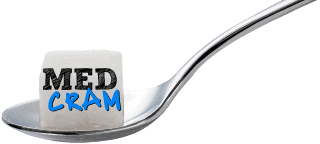In this latest video from MedCram, Dr. Seheult discusses a research paper that discusses long COVID and interferon levels. He explains that the immune system is made up of the innate immune system and the adaptive immune system. The adaptive immune system is the part of the immune system that makes antibodies and takes a little while for it to identify the antigen and form antibodies against it. He primarily states that he’s going to be discussing the innate immune system which is important because it can recognize foreign molecules. One of the major mechanisms that the innate immune system has against viruses and other diseases is interferon. Interferon is especially important in fighting against the virus that causes COVID-19 known as SARS-CoV-2. What appears to be emerging from the evidence is that if you cannot mount a good interferon response early on then you may not do as well overall. Most people who ended up with severe COVID-19 cases typically did not mount a good interferon response. Today Dr. Seheult will be discussing how interferon relates to long COVID or persistent COVID symptoms such as fatigue, shortness of breath, and muscle aches. SARS-CoV-2 itself makes a protein called MAC1 that inhibits interferon in acute COVID.
What happens to interferon levels in COVID?
So in patients with long COVID, this article from ERJ Open Research found that the post COVID is characterized by a less pronounced degree of inhibition of antiviral activity and that patients with the more severe form of COVID-19 were found to have lower levels of interferon and the recovery of their interferon revealed a positive dynamic up to seven months after the disease. However, a longer period of time was required for the full recovery of functioning interferon. From another article that was looking for persistent SARS-CoV-2 RNA individuals, they found that in a certain percentage some persons still continued to have the persistence of nonreplicating viral RNA. They estimated that 1 in 1000 of all infections and potentially as many as 1 in 200 may become persistent with intermittent high viral loads for at least two months.
This study followed 55 patients with long COVID after hospitalization for over 2 ½ years. They found that interferon levels were actually higher in patients with long COVID than those who had been unexposed. Chronic elevations in interferon levels can also make you feel poorly including symptoms such as fatigue, muscle weakness and headaches. All of the symptoms are nonspecific. So the question is can the level of interferon be high enough to cause symptoms but yet not high enough to get rid of the persistent infection? What this cohort did was actually get vaccinated. This occurred because the vaccine became available or the individual chose to get vaccinated in the hopes of getting better. The article does not mention which vaccine was used or how many vaccinations they received. What they looked at were the interferon levels before and after vaccination. They found that after vaccination interferon levels dropped. The question however does remain as to whether the elimination of the persistent viral infection is what leads to the resolution of the symptoms in interferon levels or is it the interferon levels going down on their own?
Does chronic hepatitis C have similar aspects to long COVID?
The current analogy for what we are seeing in SARS-CoV-2 is what happens with chronic hepatitis C infection. SARS-CoV-2 in the acute phase suppresses interferon levels but it is noted that interferon levels are elevated in persistent or long COVID. The same thing happens with the hepatitis C virus because it also inhibits interferon production in infected hepatocytes but then interferon production persists in hepatitis C infected cells. Per this article, the question also that comes up is would giving more interferon help get rid of this persistent virus? The clear answer in at least hepatitis C is absolutely yes. This article shows that giving pegylated interferon once a week with plus daily oral ribavirin was successful in treating patients with the hepatitis C virus genotype 2 or 3 infection and led to a sustained virologic response defined as the absence of detectable HCV RNA in about 80-90% of patients treated.
So clearly interferon is one of the important markers of inflammation and obviously is playing some type of role in long COVID. However as to exactly what treatment should be given remains to be fully understood. Obviously more research is needed at this time.
LINKS / REFERENCES:
Spontaneous, persistent, T cell–dependent IFN-γ release in patients who progress to Long Covid (Science Advances) | https://www.science.org/doi/10.1126/s…
Viruses and interferon: a fight for supremacy (Nature) | https://www.nature.com/articles/nri888
Interferon Responses Could Explain Susceptibility to Severe COVID-19 (Medium) | / interferon-responses-could-explain-suscept…
Impaired type I interferon activity and inflammatory responses in severe COVID-19 patients (Science) | https://www.science.org/doi/10.1126/s…
Examination of autoantibodies to type I interferon in patients suffering from long COVID (Journal of medical virology) | https://pubmed.ncbi.nlm.nih.gov/37698…
SARS-CoV-2 Mac1 is required for IFN antagonism and efficient virus replication in cell culture and in mice (PNAS) | https://www.pnas.org/doi/10.1073/pnas…
Early Treatment with Pegylated Interferon Lambda for Covid-19 (NEJM) | https://www.nejm.org/doi/full/10.1056…
Hyperthermia in humans enhances interferon-gamma synthesis and alters the peripheral lymphocyte population (Journal of interferon research) | https://pubmed.ncbi.nlm.nih.gov/3132509/
The biological activity of interferons in post-COVID syndrome (ERJ) | https://openres.ersjournals.com/conte…
Prevalence of persistent SARS-CoV-2 in a large community surveillance study (Nature) | https://www.nature.com/articles/s4158…
Interferon Response in Hepatitis C Virus-Infected Hepatocytes: Issues to Consider in the Era of Direct-Acting Antivirals (International journal of molecular sciences) | https://www.ncbi.nlm.nih.gov/pmc/arti…
Treatment of hepatitis C virus infection with interferon and small molecule direct antivirals: viral kinetics and modeling (Critical reviews in immunology) | https://www.ncbi.nlm.nih.gov/pmc/arti..
